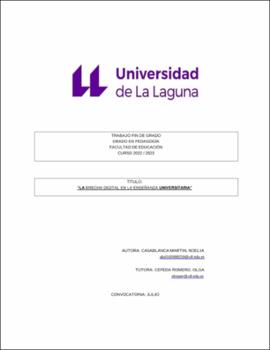La brecha digital en la enseñanza universitaria
Fecha
2023Resumen
Este trabajo se centra, mediante una revisión teórica, en analizar la brecha digital en docentes y estudiantes universitarios en España. Se han recopilado y analizado estudios relevantes publicados desde 2010 en adelante. El objetivo ha sido comprender el nivel de alfabetismo digital de los docentes y estudiantes, así como identificar sus causas y consecuencias. Los hallazgos han indicado que el nivel de alfabetismo digital entre los docentes universitarios en España ha sido variado, con algunos mostrando un alto nivel de habilidades digitales y otros con habilidades limitadas. Además, se ha encontrado que han existido diferencias en el acceso y uso de las Tecnologías de la Información y Comunicación (TIC) entre diferentes grupos de docentes y estudiantes universitarios, lo que ha contribuido a la brecha digital. Se han identificado varias causas de la brecha digital, como barreras socioeconómicas, falta de infraestructura tecnológica y resistencia al cambio. Asimismo, se han destacado las consecuencias de esta brecha en el aprendizaje y la enseñanza, incluyendo el rendimiento académico y la inclusión social. Las implicaciones de estos hallazgos son relevantes. Se ha resaltado la necesidad de programas de formación y desarrollo profesional para mejorar las habilidades digitales de los docentes universitarios. Además, se ha enfatizado la importancia de garantizar el acceso equitativo a las TIC y de apoyar su uso efectivo en la enseñanza. This work has focused on analyzing the digital divide in teachers and university students in Spain. Relevant studies published from 2010 onwards have been collected and analyzed. The objective has been to understand the level of digital literacy of teachers and students, as well as to identify the causes, consequences and possible strategies to close this gap. Findings have indicated that the level of digital literacy among university teachers in Spain has been mixed, with some showing a high level of digital skills and others with limited skills. In addition, it has been found that there have been differences in the access and use of Information and Communication Technologies (ICT) between different groups of teachers and university students, which has contributed to the digital divide. Several causes of the digital divide have been identified, such as socioeconomic barriers, lack of technological infrastructure, and resistance to change. Likewise, the consequences of this gap in learning and teaching have been highlighted, including academic performance and social inclusion. The implications of these findings are relevant. The need for training and professional development programs to improve the digital skills of university teachers has been highlighted. In addition, the importance of ensuring equitable access to ICTs and supporting their effective use in teaching has been emphasized.





